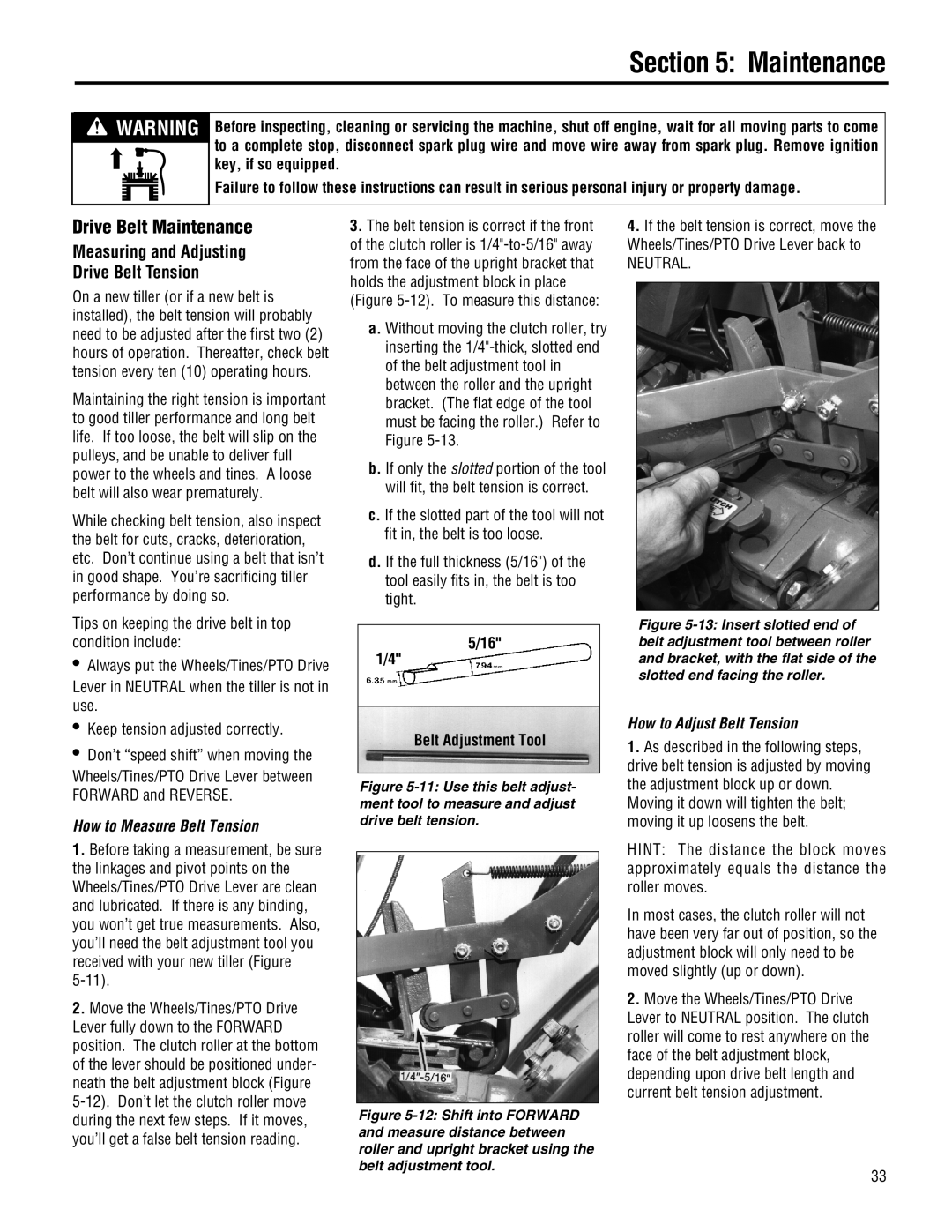
Section 5: Maintenance
WARNING
Before inspecting, cleaning or servicing the machine, shut off engine, wait for all moving parts to come to a complete stop, disconnect spark plug wire and move wire away from spark plug. Remove ignition key, if so equipped.
Failure to follow these instructions can result in serious personal injury or property damage.
Drive Belt Maintenance
Measuring and Adjusting
Drive Belt Tension
On a new tiller (or if a new belt is installed), the belt tension will probably need to be adjusted after the first two (2) hours of operation. Thereafter, check belt tension every ten (10) operating hours.
Maintaining the right tension is important to good tiller performance and long belt life. If too loose, the belt will slip on the pulleys, and be unable to deliver full power to the wheels and tines. A loose belt will also wear prematurely.
While checking belt tension, also inspect the belt for cuts, cracks, deterioration, etc. Don’t continue using a belt that isn’t in good shape. You’re sacrificing tiller performance by doing so.
Tips on keeping the drive belt in top condition include:
•Always put the Wheels/Tines/PTO Drive
Lever in NEUTRAL when the tiller is not in use.
•Keep tension adjusted correctly.
•Don’t “speed shift” when moving the
Wheels/Tines/PTO Drive Lever between FORWARD and REVERSE.
How to Measure Belt Tension
1.Before taking a measurement, be sure the linkages and pivot points on the Wheels/Tines/PTO Drive Lever are clean and lubricated. If there is any binding, you won’t get true measurements. Also, you’ll need the belt adjustment tool you received with your new tiller (Figure
2.Move the Wheels/Tines/PTO Drive Lever fully down to the FORWARD position. The clutch roller at the bottom of the lever should be positioned under- neath the belt adjustment block (Figure
3.The belt tension is correct if the front of the clutch roller is
a.Without moving the clutch roller, try inserting the
b.If only the slotted portion of the tool will fit, the belt tension is correct.
c.If the slotted part of the tool will not fit in, the belt is too loose.
d.If the full thickness (5/16") of the tool easily fits in, the belt is too tight.
5/16"
1/4"
Belt Adjustment Tool
Figure
Figure
4.If the belt tension is correct, move the Wheels/Tines/PTO Drive Lever back to
NEUTRAL.
Figure
How to Adjust Belt Tension
1.As described in the following steps, drive belt tension is adjusted by moving the adjustment block up or down. Moving it down will tighten the belt; moving it up loosens the belt.
HINT: The distance the block moves approximately equals the distance the roller moves.
In most cases, the clutch roller will not have been very far out of position, so the adjustment block will only need to be moved slightly (up or down).
2.Move the Wheels/Tines/PTO Drive
Lever to NEUTRAL position. The clutch roller will come to rest anywhere on the face of the belt adjustment block, depending upon drive belt length and current belt tension adjustment.
33
